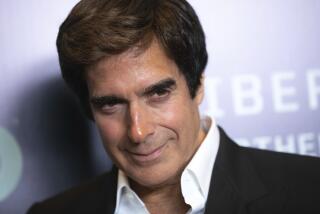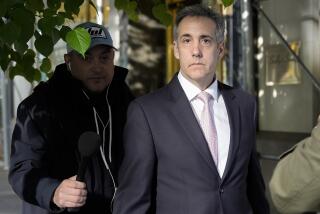Harvey Weinstein paid ex-spies and private detectives to find dirt on accusers and journalists, report says
In an interview with Stephen Colbert on Friday, New Yorker journalist Ronan Farrow promised another expose on Harvey Weinstein — this one revealing the “machine” that allows powerful men in Hollywood and in society at large to get away with being sexual predators.
That promised story landed online Monday evening, and it details how the once-powerful producer Weinstein paid private security agencies to collect damaging information on Rose McGowan, Annabella Sciorra, Rosanna Arquette and other women trying to come forward to share their sexual harassment and assault allegations against him.
These firms also targeted journalists trying to expose those allegations, explained Farrow, who said he based his reporting on dozens of pages of documents and people directly involved in Weinstein opposition research.
Full Coverage: Harvey Weinstein sexual harassment scandal »
The firms included Kroll, one of the world’s largest corporate-intelligence companies, and Black Cube, an enterprise run largely by former officers of Mossad and other Israeli intelligence agencies, Farrow reported. Black Cube, which has branches in Tel Aviv, London, and Paris, “offers its clients the skills of operatives ‘highly experienced and trained in Israel’s elite military and governmental intelligence units,’ according to its literature,” Farrow said.
Two private investigators from Black Cube, using false identities, met with McGowan, who eventually publicly accused Weinstein of rape, Farrow said. The purpose was to extract information from her.
One of the investigators was a former officer in the Israeli Defense Forces who pretended to be a women’s-rights advocate and secretly recorded at least four meetings with McGowan, Farrow said.
McGowan’s growing sense that she was being spied upon by operatives who initially struck her as friendly people deepened her sense of paranoia.
“It was like the movie ‘Gaslight,’ ” she told Farrow. “Everyone lied to me all the time.”
In other cases, Weinstein directed certain journalists to obtain interviews with accusers and other women and report back to him with the details, Farrow said. One of those journalists was Dylan Howard, the chief content officer of American Media Inc., which publishes the National Enquirer.
A December 2016 email between Weinstein and Howard showed that Howard shared material obtained by one of his reporters; it was part of Weinstein’s effort to disprove McGowan’s rape allegations, Farrow said.
Howard didn’t deny sharing “off the record” information with Weinstein, telling Farrow he did so to protect the interests of his company, which had a television-production agreement with Weinstein.
Howard told Farrow that he needed to seek out, but not publish, “information about people who Weinstein insisted were making false claims against him.”
He said, “To the extent I provided ‘off the record’ information to Mr. Weinstein about one of his accusers—at a time when Mr. Weinstein was denying any harassment of any woman—it was information which I would never have allowed AMI to publish on the internet or in its magazines.”
Sciorra, who later went public in the New Yorker with her own rape allegation against Weinstein, said she received a phone call from a male journalist whom she found suspicious. She got off the phone as quickly as possible.
“It struck me as BS,” she told Farrow. “And it scared me that Harvey was testing to see if I would talk.”
Farrow said this freelancer also called a reporter from New York magazine as well as him. Farrow said an investigative firm gathered background information about him, while another firm gathered background information on Adam Moss, the editor-in-chief of New York magazine, which was in the process of preparing a report on Weinstein.
In January, New York opted against publishing their Weinstein story, mostly because the magazine didn’t have women going on the record with their allegations against the producer, the reporter acknowledged.
Like McGowan, some of the women Weinstein allegedly targeted for surveillance acknowledged that his use of security firms to investigate them “deepened the challenge of speaking out.”
“It scared me,” Sciorra said, “because I knew what it meant to be threatened by Harvey. I was in fear of him finding me.”
But Farrow points out that Weinstein’s campaign to track and silence his accusers ultimately crumbled. Since multiple allegations of sexual harassment and assault were initially published in the New York Times and the New Yorker, nearly 80 women have come forward to share their stories about Weinstein.
The producer has lost his company, been kicked out of the Academy of Motion Picture Arts and Sciences and is under criminal investigation in at least three different jurisdictions, with New York City police saying they were developing a strong criminal case against him involving an actress’s claim that he raped her seven years ago.
More to Read
Inside the business of entertainment
The Wide Shot brings you news, analysis and insights on everything from streaming wars to production — and what it all means for the future.
You may occasionally receive promotional content from the Los Angeles Times.








